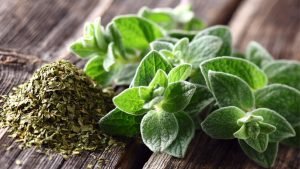Oregano (Coleus aromaticus) is a medicinal herb characterized by its abundant and soft branches and its distinct, strong fragrance. Its leaves are 2–3 inches long, heart-shaped, and vibrant green. For generations, oregano has been used not only as a culinary herb but also as a traditional medicine. Recent studies have uncovered its potential as an herbal remedy, validating its role in natural medicine.
Traditional Uses of Oregano

Oregano has long been valued in traditional medicine for its health benefits. Below are some of its common uses:
- Relieves cough, colds, and fever, especially in infants. Oregano tea or extract is traditionally used to soothe respiratory ailments and reduce fever symptoms.
- Alleviates sore throat (pharyngitis). Its natural anti-inflammatory and antimicrobial properties make it effective for throat discomfort.
- Treats boils and muscle pain. The leaves are applied topically to relieve inflammation and promote healing.
- Addresses various other ailments. Oregano is also used as a remedy for urinary tract infections (UTI), stomach pain, and insect bites.
These traditional practices reflect oregano’s versatility in addressing a variety of minor health concerns.
How to Use Oregano
Oregano can be prepared and applied in several ways depending on the ailment:
- For cough and colds. Boil a cup of fresh oregano leaves in three cups of water for 10–15 minutes. Drink one cup of the decoction three times a day to relieve symptoms.
- For cough and rheumatism. Extract the juice of fresh oregano leaves by crushing or squeezing them. Take one teaspoon of the juice three times daily for relief.
- For boils, wounds, or insect bites. Crush fresh oregano leaves into a paste and apply it directly to the affected area once a day to reduce swelling and promote healing.
Precautions and Warnings
While oregano is considered a safe and effective home remedy, there are important points to keep in mind:
- Not a substitute for prescribed medications. Herbal remedies, including oregano, should not replace doctor-recommended treatments for serious conditions.
- Consult a doctor for persistent symptoms. If symptoms persist or worsen, it’s best to seek professional medical advice.
- Inform your doctor about herbal use. If you’re taking oregano or any herbal medicine, let your healthcare provider know to avoid potential interactions with prescribed drugs.
- Potential side effects. While rare, some individuals may experience side effects from using oregano, such as allergic reactions. Always start with small amounts and observe your body’s response.
Oregano is a time-honored remedy that provides relief for common ailments like cough, colds, and minor skin conditions. Its antimicrobial and anti-inflammatory properties make it a valuable addition to home remedies. However, always practice caution when using herbal treatments and consult a healthcare professional when in doubt.


